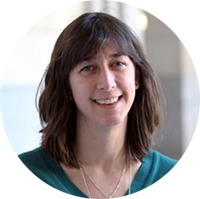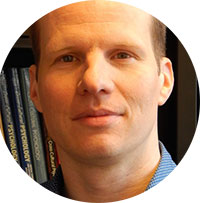'The Conference Is a Great Place for Meeting People and Exchanging Ideas'
As HSE’s XVI April International Academic Conference on Economic and Social Development draws to a close on April 10, international participants comment on their experience and share their impressions.

Lauren McCarthy, Assistant Professor of Political Science and Legal Studies at the University of Massachusetts Amherst and a Research Fellow at the Center for the Study of Institutions and Development at the Higher School of Economics in Moscow
I’ve been working with HSE for several years, but this is my first time at the April Conference. I think it is fantastic: very interesting papers and experts.
I thought the conference was wonderful, I’ve learned a lot. I came to the Law and Economics section, there were presentations by lawyers and really interesting research is being done there. I also attended sessions on the arbitrage court and on migration, both of which were great. A lot of really good empirical work was being done, and I was very excited to hear more about it.
I did my research of Russian police in 2007 and 2008, when they were certainly more open. I maintained contact with them, and it was a lot of research over a long period of time – almost seven years. Working in Russia requires a lot of investment – I spent so much time on learning Russian – but I love Russia and want to make sure I’m able to keep coming back here. I’m interested in continuing the work on trafficking and on police: I just finished the previous project and cannot really identify the next one. I’ve been cooperating with Andrei Yakovlev’s Center for the Study of Institutions and Development for several years and probably will have more projects with them.
.png)
Matthias Meyer-Schwarzenberger, Institute of Political Science, University of St. Gallen
My report was about the hypothetical effect of the language structure, its grammar, on the way people behave. I really think that languages have changed a lot over the centuries. I was looking for mechanisms which might explain how the difference between the grammar of one language and the other relates to differences in social behaviour and personal efficiency and good governance.
The conference is very inspiring, because the audience is very heterogeneous, and I like that a lot. People from different academic disciplines and different countries come here to exchange their ideas. I’m already here for the second time, and that also says something! Here you can get feedback from people who are not coming from your own background and who bring in fresh and even competing ideas. You then have to figure out who is wrong and who is right, and how these things make sense together.
It’s also very important to have good relations between the Eastern and the Western parts of Europe. This is important for me personally: I am from Germany, and I was celebrating the accession of the Czech Republic to the European Union when I was an exchange student in Prague. It was important for me that Central part of Europe was closer connected to Western part of Europe. I think that the historical mission of Europe should be to have an integrated view.

Jennifer Glanville, Associate Professor, University of Iowa
The session I just attended on social capital and subjective well-being was mostly on predictors of subjective well-being. The people talked about social context and under what conditions people are happier. The last presentation was about spending time with other people, and mine was about social welfare policy.
It’s a great conference, very stimulating. I do research in a lot of areas that are the conference topics, so I’m going back home with a lot of new ideas. The audience is international and here you can get a lot of feedback on your work.

Francesco Sarracino, STATEC (Institut National de la Statistique et des Etude Economiques, Luxembourg), LCSR (HSE, Moscow)
The session on civic engagement, social capital and nationalism was very lively. The panelists dealt with very different topics, ranging from linguistic to political issues, and how these relate to civic engagement and social change. The discussants’ contribution to the panelists’ work is also very important and makes the session livelier.
This conference is bringing together scientists from many different disciplines: economists, sociologists, and political scientists. The environment is very positive, and this can only improve the circulation of ideas and the appearance of new ideas, which is actually what research needs. Overall, this conference is a great occasion for exchanging ideas, developing new ideas and possibly pushing further the quality of research.

Seger Breugelmans, Deputy Head of HSE’s International Scientific-Educational Laboratory for SocioCultural Research, Tilburg University
The conference is a great place for meeting people and exchanging ideas. One of the advantages of bringing together so many specialists in different fields is that it gives academics the chance to learn new things outside their usual sphere of interest. I am a psychologist and attending economic session was interesting for me. I will be thinking of what I've heard here for several weeks and will write down my impressions and new thoughts. I come to HSE four times in a year and like the students and colleagues. And working in two different universities in countries with different academic traditions gives me a plenty of opportunities to observe cross-cultural psychology.
My research is on understanding the psychology of different emotions in different cultures and how they influence our decision making. At the conference I spoke about greed and how it influences corruption, about different attitudes to corruption and greed in different cultures. Greed is an important motive: it is seen as both productive (a source of ambition; the motor of the economy) and destructive (undermining social relationships; the cause of the late 2000s financial crisis). However, relatively little is known about what greed is and does. With colleagues at my home university of Tilburg in the Netherlands, we are working on a cross-cultural empirical study of greed.
See also:
Applications to Participate in April International Academic Conference Now Open
HSE University is now accepting proposals to present academic reports at the XXVI April International Academic Conference named after Evgeny Yasin. Applications can be submitted until December 16, 2025. The conference events will take place mainly on-site in Moscow from April 14 to 17, 2026.
24 Countries Represented at 25th Yasin International Academic Conference Held by HSE University
The Programme Committee of the 25th Yasin (April) International Academic Conference on Economic and Social Development has summed up the initial results. In 2025, 1,384 people from 24 countries and 29 Russian regions participated in the conference, with 335 of them delivering presentations.
Stuck in the Net: How Much Time Children Spend Online
On average, a schoolchild spends 48 hours a week on studies—equivalent to a six-day working week for an adult. This was highlighted by experts at the round table ‘Domains of Children’s Well-Being Evaluation for Human Potential and Evidence-Based Social Policy Development,’ held as part of the 25th Yasin (April) International Academic Conference.
Russian and Chinese Scholars Share Experience of Transformation of Doctoral Education
The Russian and Chinese postgraduate education systems originally borrowed their institutional frameworks from the Soviet Union. However, in the 21st century, they have evolved along different paths. While key performance indicators for postgraduate programmes in Russia are declining, China is seeing a rapid increase in the number of postgraduate students. These contrasting trajectories and the reforms undertaken in each country in recent decades were the focus of a roundtable discussion held as part of the 25th Yasin (April) International Academic Conference.
Nobel Laureate Proposes Solution to Markov Equilibrium Problem
In dynamic games, a Markov equilibrium involves strategies that guide players' behaviour based on the current state of the game, rather than its entire history. This approach is effective when players have access to complete information. But when uncertainty arises in the game—for instance, when players are unsure of who they are dealing with—this approach can become problematic. Eric Maskin, Nobel Laureate in Economics and Professor at Harvard University, addressed this issue in a paper presented at the XXV Yasin (April) International Academic Conference on Economic and Social Development held at HSE University from April 15 to 18, 2025.
‘The World Is Becoming More Complex and Less Predictable’: What Scientists Say about the Future
The future is now more difficult for researchers to forecast, and events that are hard to predict are playing an increasingly significant role. But there is good news too: scientists are confident that humanity will adapt to any changes. This was the focus of discussion at the International Symposium ‘Foresight in a Rapidly Changing World,’ which took place as part of the 25th Yasin (April) International Academic Conference.
Fragmentation and Bloc Formation: How the Global Economy is Changing
Sergey Dubinin, former head of the Bank of Russia and Professor of Finance and Credit at the Faculty of Economics at Moscow State University, has delivered an honorary address at the XXV Yasin (April) International Academic Conference. He spoke about the transformation of the global monetary and financial system, as well as the Russian economy.
More Children, More Happiness: HSE Experts Study Impact of Number of Children on Russians' Assessment of Happiness
Russians with children feel happier than those without children. At the same time, the number of children influences the assessment of happiness: the more children Russians have, the happier they feel. These conclusions were outlined inthe report ‘More Children, More Happiness: The Impact of the Number of Children on Russians’ Assessment of Happiness,’ presented at the XXV Yasin (April) International Academic Conference on Economic and Social Development, held on April 15–18 at HSE University. The study was conducted by Elena Churilova, Senior Research Fellow, and Dmitry Jdanov, Chief Research Fellowat HSE International Laboratory for Population and Health.
HSE Expands Cooperation with Gulf Countries
HSE University and the Centre for International Policy Research (Qatar) have agreed to collaborate in the field of social sciences, with plans for joint research, academic exchanges, and regular expert engagement. The agreement was signed during the roundtable ‘State Capacity and State Resilience in the Global South,’ held as part of the 25th Yasin (April) International Academic Conference at HSE University.
‘We Grow Old before We Become Rich’: How BRICS Countries Can Achieve Economic Growth
Due to population aging, many countries aiming for economic prosperity have limited time left to undergo economic transformation, according to the honorary report Narratives Versus Reality on Employment and Demography: How Undermining Institutions Can Push Countries Out of the ‘Narrow Corridor’ by Santosh Mehrotra of the University of Bath. The report was presented at the XXV Yasin (April) International Academic Conference.


